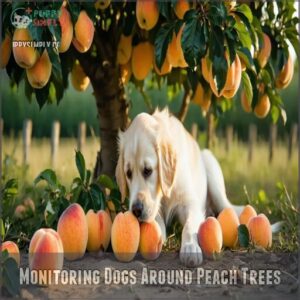This site is supported by our readers. We may earn a commission, at no cost to you, if you purchase through links.

These hard little troublemakers contain cyanide, a toxic substance that can harm your dog if ingested. Even a single pit poses risks, from poisoning to choking or causing a blockage in their intestines.
Plus, the pit’s sharp edges can damage your pup’s mouth or digestive tract. While the peach flesh itself is safe in moderation, the pit is a no-go zone.
If your dog gets curious and munches on one, watch for symptoms like drooling, vomiting, or difficulty breathing, and contact your vet immediately. Better safe than sorry regarding peach pits, as it’s always better to prioritize your dog’s safety and health, being better safe than sorry.
Table Of Contents
- Key Takeaways
- Peach Pit Dangers
- Can Dogs Eat Peach Pits
- Symptoms of Peach Pit Poisoning
- Preventing Peach Pit Poisoning
- Treating Peach Pit Poisoning
- Frequently Asked Questions (FAQs)
- Is a peach pit toxic?
- How toxic are peach trees to dogs?
- Is it safe for dogs to eat peaches without the pits?
- What other fruits contain toxic pits?
- Are there any home remedies to treat peach pit poisoning?
- How can I tell if my dog has eaten peach pits?
- How to identify peach trees in the wild?
- Can cooking peach pits reduce their toxicity?
- Are dried peach leaves harmful to dogs?
- Can peach-flavored products harm dogs?
- Conclusion
Key Takeaways
- Don’t let your dog eat peach pits—they contain cyanide, which is highly toxic and can cause poisoning, choking, or intestinal blockages.
- Watch for symptoms like vomiting, drooling, or difficulty breathing if your dog ingests a pit, and contact your vet immediately.
- Always remove pits, stems, and leaves before giving your dog peaches, as these parts are highly toxic even in small amounts.
- Keep peach pits securely disposed of and monitor your dog around peach trees to prevent accidental ingestion.
Peach Pit Dangers
You’re putting your dog’s life at risk when you let them near peach pits, which contain amygdalin that releases deadly cyanide when chewed or digested.
Beyond the toxicity concern, these hard pits can also cause choking or create dangerous intestinal blockages that might require emergency surgery.
Toxic Components in Peach Pits
Peach pits contain a dangerous cyanide cocktail that’s no joke for your dog.
Inside these harmless-looking seeds lurks amygdalin, a natural compound that breaks down into hydrogen cyanide when digested.
This cyanogenic glycoside triggers cyanide production in your pup’s system, potentially leading to serious cyanide poisoning.
Dogs with compromised liver function face even higher risks from peach pit toxicity, as their bodies struggle to process these toxic compounds efficiently.
Immediate Dangers of Peach Pits and Foliage
Now that you know what’s inside those pits, let’s talk about the immediate threats they pose.
When your dog chews a peach pit, amygdalin toxicity occurs as it releases cyanide into their system.
Beyond the chemical danger, these hard pits are serious choking hazards and can cause intestinal blockages that might require surgery.
The foliage poisoning risk extends to peach leaves and stems too, which contain the same toxic compounds.
Be aware that hydrangea plants pose similar dangers to dogs.
Don’t risk it!
Chronic Exposure Risks
While the immediate dangers of peach pits are serious, don’t overlook the sneaky threat of chronic exposure.
Your dog doesn’t need to eat a whole pit to be at risk—even small, repeated doses of amygdalin can cause dangerous buildup over time.
- Gradual weakness and unexplained lethargy may signal chronic poisoning
- Loss of appetite often precedes more severe symptoms
- Kidney damage can develop slowly without obvious warning signs
- Long-term exposure to cyanogenic glycosides can lead to organ failure
Can Dogs Eat Peach Pits
No, your dog should never eat peach pits under any circumstance. These hard stones contain amygdalin, which breaks down into hydrogen cyanide in your dog’s digestive system.
Pit toxicity levels vary, but even one pit can cause serious harm—especially in smaller breeds with higher breed susceptibility.
The cyanide exposure timeline is rapid, affecting your pup’s liver function impact within hours. If your dog ate a peach pit, contact your vet immediately.
Peach pit poisoning in dogs requires prompt attention. Instead, offer safe alternative chews that won’t pose a peach pit hazard to your furry friend.
Symptoms of Peach Pit Poisoning
You’ll notice several warning signs if your dog has consumed a peach pit, from difficulty breathing and bright red gums to vomiting and unusual lethargy.
If your furry friend shows these symptoms after being near peaches, don’t wait to see if they improve on their own – contact your veterinarian immediately.
Acute Poisoning Symptoms
If your furry friend has swallowed a peach pit, watch for these warning signs of acute poisoning:
Sudden vomiting, bright red gums, and breathing trouble signal acute poisoning—act fast and get your dog to the vet immediately.
- Sudden vomiting and excessive drooling
- Breathing difficulty or rapid breathing
- Bright cherry-red gums (a telltale sign of cyanide poisoning)
- Muscle tremors and lack of coordination
- Extreme lethargy or unusual over-excitement
These symptoms can appear within 15 minutes to a few hours after your dog ate a peach pit.
Don’t wait—immediate veterinary care is essential.
Chronic Poisoning Symptoms
Time is the silent enemy in the case of chronic peach pit poisoning.
Your dog may show gradual weakness, appetite loss, and weight changes that develop over weeks.
Long-term effects include organ damage from repeated exposure to amygdalin toxicity.
Watch for muscle tremors, lack of coordination, excessive drooling, and breathing difficulties—all warning signs of dog cyanide poisoning that shouldn’t be ignored.
Owners should also be aware of potential choking hazards when feeding peaches, to prevent potential health risks.
Kidney Failure Symptoms
Your dog’s kidneys can take a severe hit when peach pit toxicity strikes.
Watch for these warning signs of kidney failure:
- Increased thirst and excessive water consumption
- Frequent urination or changes in urination patterns
- Persistent abdominal pain or sensitivity when touched
- Significant appetite loss and refusal to eat
- Gradual weakness that worsens over days
Don’t wait to seek veterinary care if you notice these symptoms after your dog eats peach pits.
Blockage Symptoms
Beyond kidney issues, peach pits can create dangerous intestinal blockages in your dog.
Watch for these warning signs: persistent abdominal pain (your dog may whine when touched), constipation signs, increased vomiting frequency, sudden appetite loss, and lethargy onset.
Your pup might assume a "prayer position" with front legs down and rear end up—their way of trying to ease abdominal discomfort from the obstruction, which can be caused by the intestinal blockage resulting from eating peach pits.
Preventing Peach Pit Poisoning
You can protect your dog from peach pit dangers by keeping all pits securely out of reach and promptly disposing of them in covered trash containers.
Always remove pits before sharing peach treats with your furry friend, as even one pit could cause choking or release toxic cyanide compounds.
Safe Feeding Practices for Peaches
When introducing peaches to your dog’s diet, remember that moderation is key.
Remove all pits, stems, and leaves before serving. Safe peach treats include fresh cubes (½-inch pieces), homemade peach yogurt, and simple peach smoothie recipes.
Follow serving sizes based on your dog’s weight: 1-2 pieces for small dogs, 4-5 for medium breeds, and a handful for larger dogs. Always seek vet consultation before adding new fruits to your dog’s diet, and remember that fresh cubes are a great option.
Disposing of Peach Pits Safely
Proper disposal of peach pits isn’t just about tidiness—it’s essential for your dog’s safety.
Always toss pits directly into a secure, covered trash can your pup can’t access. Don’t leave them on counters or tables where curious canines might investigate.
For eco-conscious pet parents, consider designated composting options that keep these dog hazards completely out of paw’s reach while reducing landfill impact.
Remember that peaches offer vitamins when served safely.
Monitoring Dogs Around Peach Trees
Now that you’ve secured your peach pit disposal, let’s focus on keeping your dog safe around peach trees themselves.
If you have peach trees on your property, never leave your pup unsupervised in their vicinity.
The fallen fruit, leaves, and stems all pose peach pit toxicity risks to dogs.
Consider fencing off tree proximity or using preventative training to keep your furry friend away, especially during fruiting season, to mitigate these toxicity risks.
Educating Pet Owners on Peach Pit Dangers
Sharing knowledge about peach pit dangers with fellow dog owners could save a life.
Talk with your neighbors about pit toxicity awareness, especially those with peach trees. When hosting barbecues or picnics, remind guests not to toss pits where dogs might find them.
Create a neighborhood chat group for preventative measures and responsible disposal tips. Always recommend veterinary consultation if a dog ate a peach pit.
Treating Peach Pit Poisoning
If you’ve caught your dog eating a peach pit, don’t wait to see if symptoms develop – immediate veterinary care can be the difference between life and death.
Your vet will quickly assess the situation and may induce vomiting, administer activated charcoal, provide supportive care, or even perform surgery depending on how long it’s been since ingestion.
Inducing Vomiting and Gastric Lavage
When your dog eats a peach pit, quick action is vital.
You can induce vomiting using 3% hydrogen peroxide (1-5 ml/kg, max 50 ml) administered with a syringe or turkey baster.
If vomiting doesn’t occur within 15 minutes, give a second dose.
Some owners also purchase dog-specific options for this purpose.
For veterinary settings, gastric lavage might be performed if emesis fails.
Both procedures carry complication risks including aspiration pneumonia, so timing is critical for successful treatment of peach pit toxicity.
Administering Activated Charcoal
After your dog eats peach pits, activated charcoal acts as a powerful toxin magnet in their digestive system.
Your vet will calculate the dosage based on your pup’s weight and administer it orally through a syringe.
Different charcoal types exist, but veterinary-grade is best for peach pit toxicity.
You can find more information regarding dog charcoal products online.
Watch for potential side-effects like constipation while monitoring effectiveness, as it’s vital for treating peach pit poisoning when timing is critical.
Supporting Kidney Function and Oxygenation
After peach pit toxicity is identified, your veterinarian will focus on supporting your dog’s kidney function and oxygen transport systems.
IV fluid therapy flushes toxins while delivering medication support to combat cyanide’s effects on the body. It’s also worth noting that peaches offer benefits when properly prepared.
- Oxygen delivery systems help counteract amygdalin’s disruption of normal cellular respiration
- Dietary adjustments reduce stress on damaged kidneys during recovery
- Regular monitoring progress confirms treatment effectiveness and catches complications early
While treatment proceeds, your vet will continue checking signs to verify cyanide toxicity resolves and kidney function stabilizes, ensuring a successful recovery with proper medical support and regular monitoring.
Surgical Intervention for Intestinal Blockages
While supporting your dog’s kidney function is essential, sometimes surgery becomes the only option when peach pits cause intestinal blockages.
If an X-ray confirms a pit is stuck, your vet will need to surgically remove it.
| Blockage Location | Surgical Techniques | Post-Op Care | Recovery Timeline |
|---|---|---|---|
| Small intestine | Enterotomy | Pain meds | 10-14 days |
| Stomach | Gastrotomy | Antibiotics | 7-10 days |
| Colon | Colotomy | Soft diet | 14-21 days |
| Multiple areas | Resection | Activity rest | 3-4 weeks |
The table outlines the different surgical techniques and recovery timelines based on the location of the blockage, including the post-op care required for each scenario.
Frequently Asked Questions (FAQs)
Is a peach pit toxic?
Well, biting into a peach pit is like inviting danger to dinner.
It’s packed with amygdalin, which releases cyanide when ingested.
Even small amounts can be toxic, so keep those pits far away!
How toxic are peach trees to dogs?
Peach trees can be dangerous for dogs.
Their leaves, stems, and fallen fruit contain amygdalin, which releases cyanide when ingested.
Even small amounts can cause poisoning, so keep your pup away from these trees entirely.
Is it safe for dogs to eat peaches without the pits?
Yes, it’s safe for dogs to eat peaches without the pits, as long as you remove the stems and leaves too.
Just slice them into small pieces—no pits, no problem, and your pup stays happy!
What other fruits contain toxic pits?
Think of fruit pits as hidden traps—cherries, plums, nectarines, apricots, and mangoes all contain toxic compounds like cyanide.
Even apple and pear seeds pose risks.
Keep these off your dog’s snack list for safety.
Are there any home remedies to treat peach pit poisoning?
Home remedies aren’t reliable for peach pit poisoning.
Skip the DIY fixes and call your vet immediately.
Time is critical, and professional care like inducing vomiting or administering activated charcoal can save your dog’s life, as immediately seeking help is vital.
How can I tell if my dog has eaten peach pits?
Better safe than sorry" applies here—watch for vomiting, lethargy, constipation, or abdominal pain.
Bright red gums or frantic behavior could mean cyanide poisoning.
If you suspect ingestion, call your vet immediately for guidance and treatment.
How to identify peach trees in the wild?
Look for trees with long, glossy green leaves and rough, dark bark.
In spring, peach trees bloom with pink flowers.
By summer, they bear fuzzy, round fruits. The distinct sweet smell is a giveaway!
Can cooking peach pits reduce their toxicity?
Cooking peach pits doesn’t remove their toxicity since heat doesn’t eliminate the cyanide-producing compounds.
Even baked or boiled, they remain dangerous for pets and humans.
Always keep peach pits away from your furry friends!
Are dried peach leaves harmful to dogs?
Yes, dried peach leaves are harmful to dogs.
They contain amygdalin, which releases cyanide when ingested.
Even small amounts can be toxic, causing symptoms like vomiting or lethargy.
Keep peach tree debris away from pets.
Can peach-flavored products harm dogs?
Peach-flavored products can be a mixed bag for dogs.
Many contain artificial sweeteners, like xylitol, which is toxic to pets.
Always check labels, avoid additives, and stick to natural peach treats for safety.
Conclusion
A juicy peach might seem harmless, but its pit is a hidden danger for your dog.
Packed with cyanide and sharp edges, peach pits can poison, choke, or block your pup’s digestive system.
While the flesh is fine in small amounts, the pit is off-limits.
If your dog gets into one, act fast—watch for symptoms like vomiting or trouble breathing and call your vet.
Can dogs eat peach pits? Absolutely not—it’s just not worth the risk because the consequences can be severe, including trouble breathing.
















